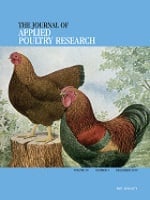Nutritional Dietary Supplements to Reduce the Incidence of Fatty Liver Syndrome in Laying Hens and the Use of Spectrophotometry to Predict Liver Fat Content
2019 J. Appl. Poult. Res. 28:435–446

Abstract
Fatty liver syndrome (FLS) in laying hens is a metabolic disease that can potentially reduce egg production while compromising the health status of the bird. This study assessed the combined use of B vitamins via the feed (FLS-MIX) or the drinking water (FLS-LIQ) to reduce FLS and the use of spectrophotometry to estimate liver fat content. Individually, caged Hy-line brown hens (n = 288) underwent a pre-experimental period (from week 66 to 67, both included) receiving a Standard diet or a Challenge diet (high energy–low protein) to nutritionally induce the FLS. Subsequently, hens followed a 2 diets (Standard; Challenge) × 3 dietary supplements (NONE; FLS-MIX; and FLS-LIQ) factorial arrangement of treatments from 68 to 73 wk old, both included. Compared to the Standard, the Challenge diet increased liver fat (188 vs. 270 g/kg DM) and reduced feed consumption, lay percentage, and egg mass production (P < 0.05). No differences in lay performance or eggshell quality were observed among dietary supplements; however, FLS-MIX significantly increased (P < 0.05) feed intake relative to NONE. On birds subjected to the Challenge diet, the use of FLS-MIX and FLS-LIQ led to lower (P < 0.05) liver fat relative to NONE. Regression analysis between the L, a+, and b+ values and liver fat content provided significant (P < 0.001) regression equations to estimate liver fat content (R2 = 0.62). Results of this study suggest that B vitamin supplements could be an effective means to reduce liver fat deposition when hens are susceptible of suffering FLS, and that spectrometry could be a reliable tool to estimate liver fat content.